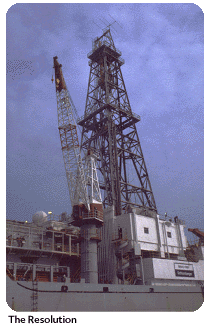Ice Ages, Sea-levels and Marine Archaeology
These are links to sites dealing with Ice Ages, associated sea-level changes, vulcanism, tectonic activity etc., and also with marine archaeology - the discipline through which submerged ruins are investigated. Huge catastrophies in the recent (e.g. postglacial) past are gaining increased recognition among geologists, and have, in all likelihood, been responsible for the submergence of much archaeological evidence.
Extreme Sea Level Changes

This site contains three sets of maps of the Americas, one with current sea-level, one with minus 140 metres of sea (similar to conditions at last glacial maximum) and land with plus 65 metres of sea-level (where we could be headed?)
The maps are 5 arc-minute resolution, which is pretty good. But they only cover the Americas.
Ocean drilling tells tales of shorelines past

Article on importance of core samples as evidence of past sea-levels. Deals specifically with East Coast America. And that's the problem with core samples - while they're very reliable indicators of past sea-level (because they incorporate eustatics, isostatics and tectonics - basically anything that affected relative sea-level), not enough have been performed to let us know about all interesting areas of land submergence.
Potsdam Institute for Climate Impact Research
This Institute has made a number of breakthroughs in recent years. For example, last year resaerchers there found that precession might have been responsible for the creation of the Sahara.
The Astronomical Theory of Climate Change

Informative page at the US National Geophysical Data Centre dealing with the fascinating possibility that astronomical cycles play a determining role in all the climatic cycles on Earth, including, most profoundly, the Ice Ages. This idea, known as the Milankovitch Theory, was discussed in Fingerprints of the Gods, and may be crucial to understanding the message of the Ancients.
Underwater Archaeology department of Texas A&M University
This site, that of the Underwater Archaeology department of Texas A&M University contains a great many links organised by subject. The section on archaeology is especially useful, with links being organised by area and methodology - and there's a great deal of fascinating information on underwater archaeology. Highly recommended.







